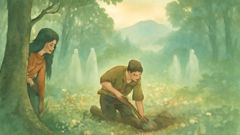Introduction
In the heart of Romania’s Carpathian Mountains, where ancient forests cloak the slopes and wildflower meadows unfurl like living tapestries, legends grow as surely as the moss upon ancient stones. Here, beneath canopies of beech and fir, the air shimmers with a sense of old magic. Sunbeams filter through mist at dawn, illuminating dew-speckled petals, and the scent of earth and growing things lingers on every breeze. For centuries, the people of these lands have whispered stories about the Zana—mysterious fairy-like women who dwell in secret groves, guardians of nature’s wonders and gentle protectors of those whose hearts are pure. They are said to move unseen through the night, their footsteps coaxing blooms from the soil, their laughter echoing in the song of the mountain streams. Flowers, it is told, owe their colors and fragrance to the Zana’s careful touch, and the kind-hearted, lost or in peril, may sometimes glimpse a shimmer of silk or hear a soft voice in the darkness, guiding them home. This is a land where the line between myth and reality seems to blur, where every child grows up listening to tales of invisible hands weaving beauty from the wild. The Zana, both feared and revered, embody the delicate balance between humanity and nature. Their gifts are not for the greedy or the cruel, but for those who move gently upon the earth and cherish its secrets. Our story begins in a remote village nestled between mountain and meadow, where a young shepherdess named Mirela, with eyes as bright as the cornflower and a spirit as wild as the hills, is about to discover that legends can walk beside us when the heart is open and the soul is kind.
The Whispering Meadows
Mirela had spent her life among the hills, a child of earth and sky. She awoke each morning in a thatched cottage at the edge of Dacianu, a village so small that its handful of homes seemed to cling to the forest’s hem for warmth. Her mother wove with nimble fingers, her father tended a flock of sheep, and Mirela—barefoot and curious—had long since learned the hidden paths that wound between the pines and poplars. Every day, she led her sheep into the upland pastures, where the wildflowers grew thick and the air was sweet with the scent of clover and thyme. It was a place where legends felt close: the villagers left offerings of bread and honey at the roots of ancient trees, hoping for the Zana’s favor. Mirela sometimes felt as though she moved through a world touched by unseen eyes. The meadows whispered secrets in the wind, and once, when she sang to her sheep at dusk, she thought she heard a second voice in the hush—clear, high, and sweet as bells.

One midsummer morning, Mirela lingered beside a spring, cupping water in her palms. As she drank, she noticed a patch of flowers she’d never seen before: white as snow with centers like drops of gold. Entranced, she reached to touch them—then froze. Among the petals, a faint glow shimmered, and from the corner of her eye, a figure flickered. It was gone as soon as she blinked, leaving behind only a lingering warmth and a sense that something had changed. All that day, the sheep were restless, crowding close to her skirts as she wandered. The wind grew playful, tangling her hair, and everywhere she looked, the flowers seemed brighter, more alive.
That evening, as she returned home, Mirela’s grandmother sat by the hearth, her gnarled hands busy spinning wool. The old woman’s eyes, sharp as a hawk’s, flickered to Mirela. “You’ve seen them,” she said quietly. Mirela’s heart skipped. “Who?” she whispered. “The Zana. They show themselves to those who notice what others miss. Remember: their gifts are precious, but never ask for more than is offered.” That night, Mirela dreamed of silver streams and fields ablaze with color, of laughter drifting through the trees and gentle hands guiding her steps. She woke with a sense of wonder that lingered as she stepped once more into the wild.
The Secret of the Zana
Days passed, and Mirela found herself returning to the spring, drawn by curiosity and a sense of longing she couldn’t name. She began to notice things she’d overlooked before: the way certain flowers unfurled only at twilight, or how droplets on moss seemed to capture rainbow light. One afternoon, she followed a trail of bluebells to a grove where the air felt different—charged and expectant. There, sitting upon a mossy stone, was a woman who seemed both young and ageless. Her gown shimmered with colors that shifted like sunlight on water, and her hair cascaded in waves of silver and gold. When she smiled, the shadows around her brightened. “You see me as I am,” the woman said. “I am Liana, a daughter of the Zana.”

Mirela knelt, both frightened and awestruck. “Why have you come?” she managed. Liana’s voice was gentle. “We watch over these hills, nurturing what is good. Flowers bloom where our feet touch; we shield those whose hearts are kind.” She reached for Mirela’s hand. “The world is changing. Men carve the forests, dig deep for silver, and forget the old pacts. But there are still those who remember.”
The days that followed were filled with wonders. Liana taught Mirela to listen for the songs of flowers and the language of wind. She learned how to braid wild thyme into charms of protection, and how the smallest kindness—a wounded bird cradled, a hungry fox left scraps—could ripple through the web of life. Sometimes, Mirela glimpsed other Zana: one with hair like wheat who danced on the breeze, another whose laughter made the brook run clear after rain. The Zana moved lightly in the world, unseen by most, but ever present.
One evening, as the sun dipped behind jagged peaks, Liana confided a secret. “There are those who seek to harm what we protect. A stranger has come—a man from far away, who hunts for treasures buried in these hills. He cares nothing for beauty or balance.” Liana’s gaze grew troubled. “If the meadows are trampled, if the old trees fall, we may fade with them. But a heart brave and true can change even fate.”
The Stranger in the Forest
The village of Dacianu had always been wary of outsiders, but when the stranger arrived—clad in fine boots and bearing a heavy pack—he brought gifts and easy laughter. His name was Radu, and he claimed to be a merchant seeking rare herbs for healing. Yet Mirela’s sheep shied from his touch, and dogs barked when he passed. She watched as he wandered further into the meadows, taking samples, uprooting plants by the handful, leaving muddy scars where flowers had bloomed.

One evening, Mirela followed him, slipping silently as a fox through the dusk. She saw him pause beneath an ancient oak, where he dug with a spade, muttering about veins of silver and “the treasure the forest hides.” When he left, the earth was wounded and bare. Mirela knelt, pressing her palms to the soil. “Forgive him,” she whispered. The air grew cold; she felt eyes upon her.
That night, a storm lashed the village. Lightning split the sky, and wind howled through the trees. In the morning, Mirela found the meadow trampled, flowers crushed. The spring where she’d met Liana was choked with mud. Heartsick, she sought the grove, but the Zana were gone, their laughter replaced by silence. Only a single blossom remained—a star-shaped flower of impossible blue. Mirela cradled it in her hands, and in its petals she saw tears glistening.
She ran to her grandmother. “The Zana are leaving,” she cried. “The forest is dying.” The old woman nodded gravely. “The balance is broken. But you must not despair. Even a single seed can restore a meadow if planted with love.”
Determined, Mirela set to work. She gathered what seeds she could find, sowing them in the wounded earth. She sang as she worked—old songs of hope and remembrance. When she grew weary, she remembered Liana’s words: a heart brave and true can change fate. Each night she prayed for the Zana’s return.
Conclusion
The seasons turned, and spring returned to the Carpathians. Where Mirela had sowed her seeds, green shoots pushed through the thawing soil. Her songs grew stronger; children joined her, their laughter rising on the wind. Slowly, the meadows healed, and with them, the spirit of the land brightened. One dawn, as sunlight spilled across the hills, Mirela awoke to find the spring clear and bubbling. Around it, a ring of star-shaped blue flowers had blossomed overnight, their petals aglow with an unearthly light. And in the hush of morning, she heard it—the faint music of laughter, carried on the breeze. The Zana had returned. Liana appeared before her, radiant with gratitude. “You have shown that even the smallest act of care can restore what was lost. Our world endures because of hearts like yours.” With a smile, Liana pressed a woven garland of fresh wildflowers into Mirela’s hands—a blessing for her and all who would walk gently upon the earth. The legend of the Zana lived on, passed from one generation to the next. In every blooming meadow, in every act of kindness to nature or neighbor, their magic lingered. And for those who truly listened, the whisper of fairy wings and the soft glow of wildflowers at dawn would always be a promise: that as long as compassion and wonder thrived, the Zana would walk beside them, unseen but ever watchful.













